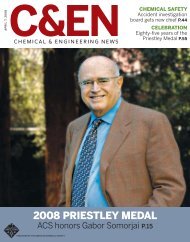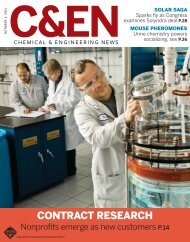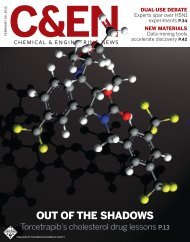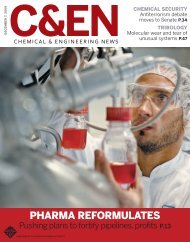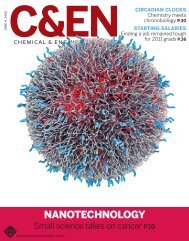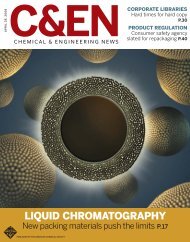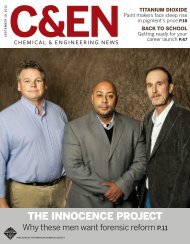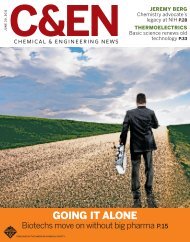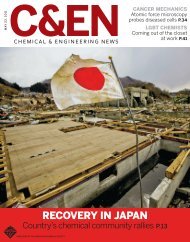Chemical & Engineering News Digital Edition ... - IMM@BUCT
Chemical & Engineering News Digital Edition ... - IMM@BUCT
Chemical & Engineering News Digital Edition ... - IMM@BUCT
Create successful ePaper yourself
Turn your PDF publications into a flip-book with our unique Google optimized e-Paper software.
EMPLOYMENT OUTLOOK<br />
BENJAMIN LU<br />
INTERNATIONAL<br />
INTERNSHIPS<br />
RESEARCH OPPORTUNITIES ABROAD offer students<br />
unique opportunities for career development,<br />
personal growth, and intercultural exchange<br />
KENNETH J. MOORE, C&EN WASHINGTON<br />
INCORPORATING an internship into<br />
a student’s educational program isn’t a<br />
new idea, but international internships<br />
have been few and far between. Cheryl A.<br />
Matherly, associate dean for global education<br />
at the University of Tulsa, says that<br />
many science students write off going<br />
abroad because they think that they won’t<br />
be able to find the time. Chemistry and<br />
engineering students do, however, have<br />
opportunities to gain international experiences,<br />
which are increasingly important<br />
in the workplace as the chemical industry<br />
becomes more globalized.<br />
According to students C&EN interviewed,<br />
the cultural and educational challenges<br />
posed by international experiences<br />
gave them a sense of personal accomplishment<br />
and independence and helped them<br />
plan their career paths. Employers say they<br />
value students’ ability to survive and thrive<br />
in challenging situations such as adjusting<br />
to life in a foreign country.<br />
During an internship abroad, students<br />
have to be more self-reliant than those<br />
who are merely studying abroad, Matherly<br />
says. When “studying, you have all the cultural<br />
challenges, but you know how to be a<br />
student. When interning, you have to be a<br />
scientist, and you have to cook for yourself<br />
and wash your clothes but also do this in a<br />
place where you can’t read the names on<br />
the bottles to figure out what goes in the<br />
washing machine.”<br />
Matherly is a co-principal investigator<br />
(co-PI) on the National Science Foundation<br />
grant that funds Rice University’s Nano-<br />
Japan program and was previously director<br />
of Rice’s Career & International Education<br />
center before moving to Tulsa. The threeyear-old<br />
program offers a 10-week research<br />
experience in Japan to first- and secondyear<br />
undergraduate engineering students.<br />
The program includes culture and language<br />
courses in addition to academic research.<br />
“There are few programs for freshmen<br />
and sophomore science and engineering<br />
students,” Matherly says, “and there are<br />
GETTING ORIENTED During orientation,<br />
NanoJapan participants traveled to<br />
Mount Nantai, in Nikko. From left, Raj,<br />
O’Connell, Amal El-Ghazaly, Andrea Barrett,<br />
Daryl Spencer Jr., Tiffany Kuo, Tolulope<br />
Ogubekun, Shiv Gaglani, Norman Pai, and<br />
Keiko Packard, the culture instructor for<br />
the orientation.<br />
few programs to attract them to graduate<br />
studies in physical sciences.” NanoJapan<br />
specifically targets students who are interested<br />
in nanotechnology, she says, “to give<br />
them a meaningful and substantial research<br />
experience and to do it at a time when they<br />
still have an opportunity to do something<br />
about it—select courses, have more research<br />
experiences, or study a language. We<br />
built the program as a career catalyst.”<br />
This past summer’s NanoJapan had 80<br />
applicants from universities across the<br />
U.S., but only 16 students were selected for<br />
the program. “We are looking for students<br />
with a strong interest in a relatively narrow<br />
field of research”—carbon nanotubes,<br />
nanoscale semiconductor devices, and<br />
nanophotonics—says Sarah R. Phillips, the<br />
co-PI on the grant who deals with recruitment,<br />
applications, and program planning<br />
for NanoJapan. “We are also looking for<br />
students with a strong interest in Japan,<br />
living there and learning the culture and<br />
language,” she says.<br />
“The grant funding required a heavy<br />
educational component and a strong commitment<br />
to international science to develop<br />
globally savvy scientists and engineers,”<br />
WWW.CEN-ONLINE.ORG 57 NOVEMBER 3, 2008



